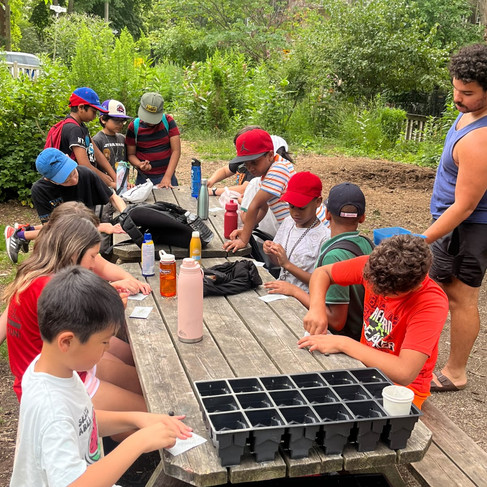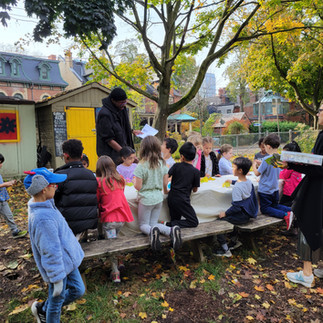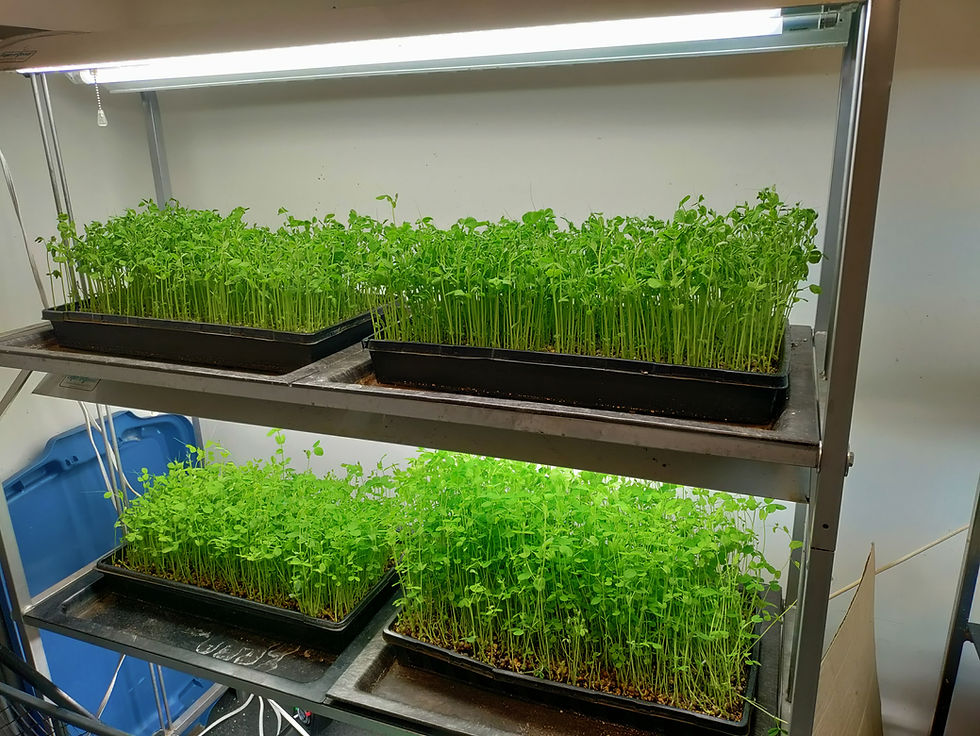Winchester JSPS - A Year of Change Begins
- greenthumbs2021
- Dec 2, 2024
- 4 min read
by Tristan Andrews, Aiden Crosby and Sunday Harrison
Change through the seasons and over the years: in 2024 Green Thumbs hosted
40 programs (including field trips to Allan Gardens in spring), creating 781 student participant opportunities at Winchester JSPS.
Winchester Public School hosts the biggest garden space that Green Thumbs manages. This year we utilized the space to offer workshops throughout the changing seasons, with something different to offer participants each month. Starting in Allan Gardens Children’s Conservatory in March, classes planted long-season crops and learned about soil care including vermicomposting.


Soon, back at school, the garden offered many tasting experiences, first Red Currants, then Serviceberries and Mulberries. In June, participants learned how to identify and harvest fruits growing in the garden.
Meantime, the school started planning a capital project that would ultimately mean losing ⅓ of the existing garden, and requiring 20-year old fruiting trees to be moved, hopefully successfully. (We won’t know for another year.) Green Thumbs got in on the planning for the capital project, which had been initiated by the former principal. Issues such as sightlines, perimeter fencing and safety when wooden structures are employed, came to the fore. While we were sad at losing 1/3 of the garden space, we understand that the school population is growing and new play spaces are desired. We're losing the strip of land that you see here, but the food-producing beds will be moved into a sunnier spot.

This year also marks the return of our weekly volunteer Drop-in programs, where participants can engage in horticultural activities and training (learning about compost management, garden maintenance and tool safety). It was the site for many of the School Garden Land Back program segments, a volunteer training program to enable parents to help in their own school gardens, and deepened the Indigenous mentorship both for us at Green Thumbs and the parent volunteer participants. It was also the site for the after-school Kahik Growers project, a spinoff from our previous Urban Roots Youth program, but this time concentrating more on Indigenous content. Kahik means “fruit” in the Mohawk language, relevant of course to our region in Tkaronto/Toronto. Below: participants plant beans using hand-spacing; care for the Sweetgrass bed; Ella showing off braids that were given out in the Indigenous community.

In July, we ran a three-week program called Square-Roots! In collaboration with Square Circle; a non-profit organization that uses Social Circus arts to engage youth in underserved neighbourhoods - and our neighbour at Daniels Spectrum. In the first segment, participants learned horticultural skills such as compost management, tree planting (Kentucky Coffeetrees) and identification, and garden management (identifying and pulling weeds from garden beds, watering properly). Participants combined juggling and circus skills with their garden education! Below, they potted up some baby trees and also planted new tree seed, after sanding down the seed coat.

In August, the Itreb Climate Camp, a Muslim day camp learning about climate change, came to visit our garden space, learning about urban agriculture and climate solutions. Students were given a tour of the garden and learned about compost bin management (how to maintain healthy compost; what's good/bad for compost), and made their own edible microgreen cups to take home. We discussed reducing emissions from vehicles that contain food and food waste, and the ability of healthy soils to draw down carbon from the atmosphere, through the magic of photosynthesis, combined with biodiverse microbial life beneath our feet.

In September, we ran a series of workshops looking at soil compaction, and the value of looser, deeper topsoil for the environment and our plants. The tool we used was a penetrometer, to measure the compaction by how much pressure (PSI - pounds per square inch) it takes to insert the tool to a particular depth, in various areas of the garden. This program helped students understand how permeable our garden soil is and how much water it can absorb. Participants measured and logged different sections of the garden space, noting that paths are more compacted than garden beds. This stimulated discussion about paved surfaces, how water runs off into the storm sewers. Since this summer we'd had a massive flooding event, and the new capital project was proposing to pave areas of the garden, we involved students in learning why we might not want to pave any more than we have to for accessibility needs. There will be permeable paving used in pathways in the new design, but the area proposed to be paved was reduced upon further discussion with the school board.

The Penetrometer workshop was an interactive way to teach the importance of soil absorption. Soil naturally filters pollutants before they reach groundwater or nearby bodies of water, trapping contaminants like oil, chemicals and debris. Without soil absorption we lose this natural filtration and pollutants can end up in lakes and rivers - affecting water quality and plant life.
In October, participants were given tours of the garden to taste and harvest a variety of produce from the garden space such as beans, kale, cucamelons, riverbank grapes, mint, sorrel, stevia, Thai basil, nasturtium flowers, parsley and calendula petals.
In November, we began collecting seeds from milkweed and beans, and collecting fallen leaves from around the garden space for activities. The first leaf activity had participants trace out their leaves on paper to create art pieces. The second activity we used the leaves to cover the garden beds to prepare them for the winter season. Finally, participants helped make a leaf pile and took turns jumping into it. Currently, the classes have been enjoying learning about hibernation and how to help small animals and bugs seek shelter or build a shelter for hibernation, lots of fun leaf ID and collecting, bed flipping, leaf laying, and end-of-season produce and herbs we’ve been eating!
Green Thumbs Growing Kids is a non-profit, for-impact organization based in Regent Park, with gardens located at nearby TDSB schools.





















Comments